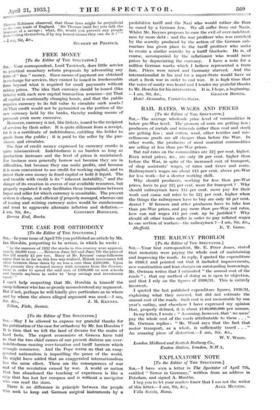RAIL RATES, WAGES AND PRICES
[To the Editor of TIIE SPECTATOR.]
Sin,—The average wholesale price level of commodities is below pre-War level. The growers of corn are getting less ; producers of metals and minerals (other than coal and steel) are getting less ; and cotton, wool, other textiles and mis- cellaneous goods are all cheaper than before the War. In other words, the producers of most essential commodities are selling at less than pre-War prices.
But rail rates on the commodities are 521 per cent. higher. Even retail prices, Lie., are only 39 per cent. higher thin► before the War, in spite of the increased cost of transport, of shop assistants' wages, of rates and taxes and rents. Railwaymen's wages arc about 115 per cent. above pre-War for less work—for a shorter working shift.
Why should producers, working for less than pre-War prices, have to pay 521 per cent. more for transport ? Why should railwaymen have 115 per cent. more pay for their work and cause rail rates to be 52i per cent. higher when the things the railwaymen have to buy are only 89 per cent. dearer ? If farmers and other producers have to take less than pre-War prices, and pay more than pre-War rail rates, how can rail wages 115 per cent. up be justified ? Why should all other trades suffer in order to pay inflated wages to one section of workers—the railwaymen ?—I am, Sir, &c.,






































 Previous page
Previous page